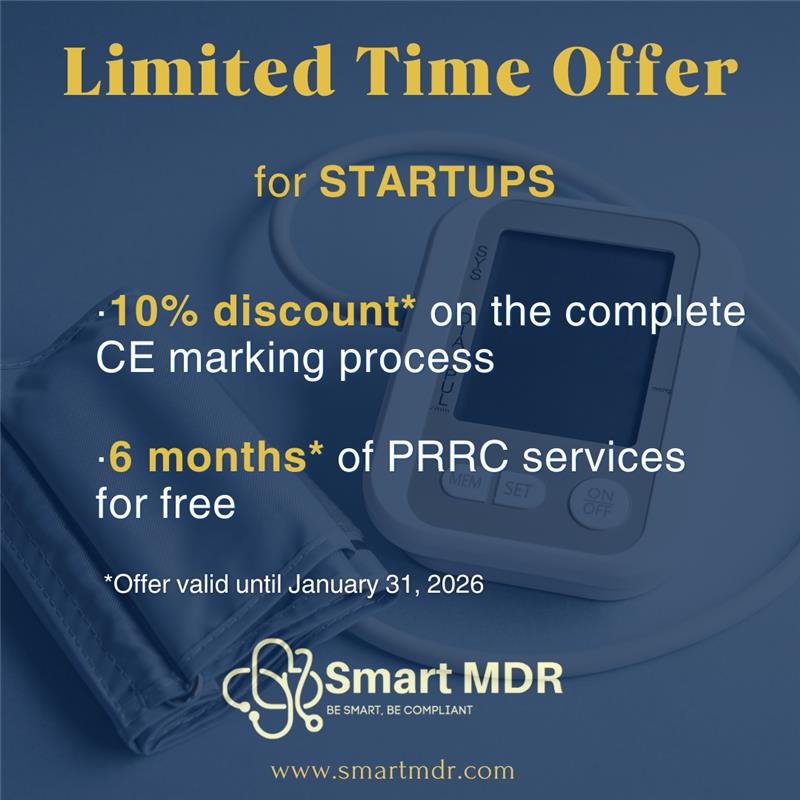Kickstart your 2026 Regulatory Strategy with Smart MDR
Did you miss our holiday announcement? Don't worry—there is still time to accelerate your market entry in 2026 with an exclusive advantage. Regulatory compliance shouldn't be a barrier to innovation. At Smart MDR, we are extending our special support for Startups to ensure your medical device, IVD, or SaMD hits the European market faster and more efficiently.
MDCG 2020-16 Rev. 4: Update on the Classification of In Vitro Diagnostic Devices (IVDs)
MDCG has published Revision 4 of MDCG 2020-16, updating the classification of in vitro diagnostic medical devices (IVDs) in accordance with IVDR Regulation (EU) 2017/746. Among the main changes is the reclassification of SARS-CoV-2 tests. In addition, adjustments have been made to the classification of blood, tissue and organ screening tests, as well as clarifications for complementary diagnostics and self-tests.
European Union Approves European Health Data Space (EHDS) Regulation
Regulation (EU) 2025/327 establishes the European Health Data Space (EHDS), an innovative system that will enable the secure sharing of health data and cross-border access to Electronic Health Records (EHRs). This initiative strengthens digital interoperability in the European Union, ensuring that citizens can access their medical data in any Member State. For manufacturers of medical devices and digital health applications, the regulation imposes new rules on security, interoperability and data traceability, requiring products claiming compatibility with EHRs to comply with specific standards and, in some cases, to be registered with EUDAMED. The first obligations will come into force from March 2027, making it essential for companies in the sector to start preparing now to ensure regulatory compliance and access to the European market.
Guidance document for submitting risk management plans
Health Canada has announced new guidance for Risk Management Plans (RMPs), reinforcing the need for pharmacovigilance and risk minimization throughout the life cycle of medicines. As of April 2027, the submission of RMPs will be mandatory in certain circumstances, such as for new drugs, biosimilars and cases of emerging risks. This update harmonizes Canadian regulations with international standards, ensuring greater safety for patients and transparency in the regulatory process. Manufacturers wishing to market products on the Canadian market must adapt to these new requirements.
Government response to consultation on Medical Devices Regulations: EU law assimilated
The MHRA has confirmed that four key EU regulations for the regulation of medical devices and in vitro diagnostic medical devices (IVDs) will be retained in the UK after May 26, 2025. The decision covers rules on common technical specifications, electronic instructions for medical devices, the use of tissues of animal origin and the supervision of approved bodies. In addition, the MHRA plans to update the legislation, replacing the reference to Regulation (EU) 207/2012 with the more recent Implementing Regulation (EU) 2021/2226. Meanwhile, further changes are expected with the upcoming "Pre-Market" legislation, which could impact the requirements for high-risk IVDs and remove temporary approvals for COVID-19 testing. Manufacturers and companies in the sector should follow these updates to ensure regulatory compliance in the UK market.
New EU HTA Regulation for Digital Medical Devices (including AI)
The recent study on the EU HTA Regulation for Digital Medical Devices (DMDs), including Artificial Intelligence-based technologies, highlights the need for adaptive assessment and European harmonisation to ensure market access and effective reimbursement. The study explores challenges and opportunities in the sector, such as the lack of focus on AI and the difficulties of adapting to the short life cycles of DMDs, but also points to improvements through the incorporation of real-world evidence. It highlights the importance of regulatory transparency and fast-track access routes, with innovative examples such as DiGA in Germany and PECAN in France. The harmonisation of assessment methodologies in the European Union is essential to foster innovation and competitiveness in the digital medical device sector.





